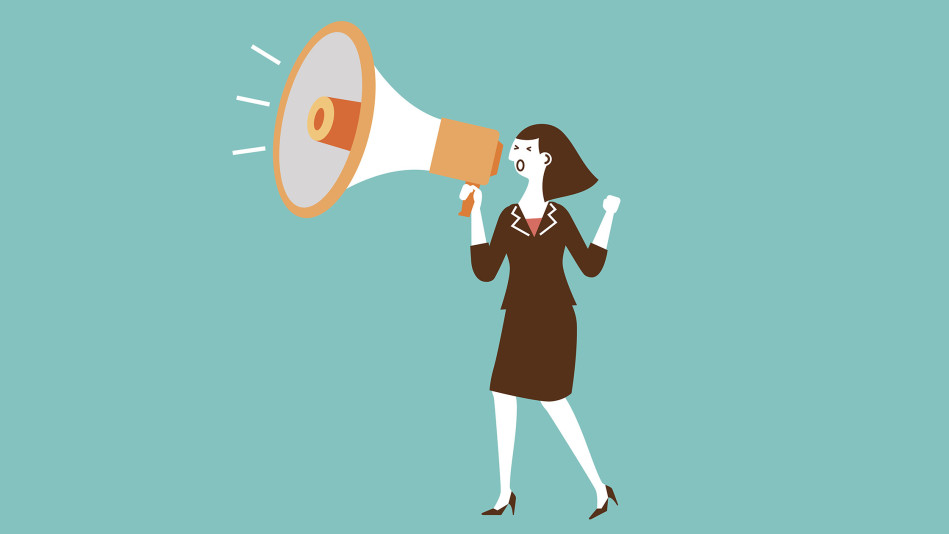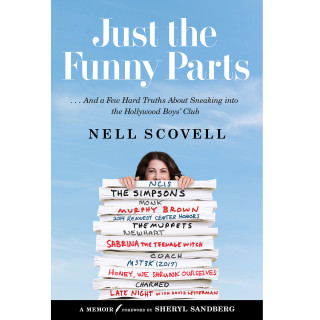For Any Woman Who's Ever Been Told She's Too "Emotional" at Work...
Writer, director and producer Nell Scovell on who's allowed to lose their cool, who isn't and the small things we can all do to begin to change the culture.

Photo: runeer/Getty Images
One of the many barriers blocking women from leadership positions is the unfair stereotype that we are "overly emotional." Like a lot of women in the workplace, I was aware of this bias, so I made a conscious effort to not give anyone the chance to label me as "crazy" or "difficult."
When I worked on TV shows like Late Night with David Letterman, The Simpsons and Newhart, I was usually the only female writer in the room. My job was to pitch jokes, come up with storylines and blend in. I thought if my male colleagues didn't notice that I was a (whisper) woman, they'd let me stick around. So I told dirty jokes, ate way too much junk food and, for three decades, tamped down my emotions at the office. I shrugged off disappointment. I laughed off harassment. When a male boss explained to me why it made sense for him to take credit for work I'd done, the smile on my face did not give away the screaming in my head. At one job, my male colleagues routinely went out for lunch together and ditched me. They'd come back with story and casting ideas, so excluding me from lunch meant I had less input. At first, I seethed quietly in my office. Then I realized I could use the time to hit the gym and sweat out my frustration.
By being tough and unemotional, I was not acting "like a man." Just the opposite. My male colleagues emoted like crazy. After a tough notes session with the network, a male writer walked into the room, screamed an obscenity and threw his script across the table. It struck me that anger is an emotion too. But nobody thought he was "hysterical." When a man storms out of the room, he's passionate. When a woman storms out, she's unstable and unprofessional.
There were times I failed to keep my emotions in check. Frustration was the hardest to contain for me. I cry because I care and I don't know how to stop caring. Once on set, I took issue with an added piece of dialogue that referred to a pregnant woman as "fat." My male boss who had pitched the line chewed me out in front of an entire crew. "I'm the showrunner," he screamed. "I get to do what I want."
My cheeks burned, and as soon as I could, I ran to the Women's room. Fortunately, I had the place to myself and could really let the tears flow.
We talk a lot about the pay gap, which needs to be fixed, but so does the emotion gap. Women are not allowed to be as authentic as men at work. And for people of color, it's even harder. Michelle Obama has spoken out about being labeled an "angry black woman" and thinking, "That is so not me," before realizing, "This isn't about me."
So we try to soften our image by adding smiley face emojis and exclamation marks to emails in an attempt to get someone to do their job. We learn how to put a professional demand in the form of a question so we won't sound too bossy.
One way to begin changing the culture is to alter this behavior when dealing with other women. Can we all make a pact to stop saying "I'm sorry" to each other for things that aren't our fault? We often don't even notice that we're doing it, so pointing it out nicely to a colleague is helpful. (And keep in mind that the proper response to being called out for saying "I'm sorry" is not saying "I'm sorry.")
We can also counteract the incorrect stereotype of the "tough man" by pointing out when men are overly emotional. Comedian Julia Claire recently wrote a tweet that I loved: "Men think women are overreacting to a culture of sexual assault and harassment and it's like, you guys remember how you reacted to the female Ghostbusters, right?"
I hope the days of bottled-up emotions for women end soon and we can all funnel the energy it takes to check our feelings into doing our actual jobs. I also long for the day when I can show the full range of emotions at work—from telling sweet stories about my kids to walking into a room after a bad notes call and screaming in frustration.
But I would never throw a script. That would be unstable and unprofessional.
 Nell Scovell is the author of Just the Funny Parts: ...And a Few Hard Truths About Sneaking into the Hollywood Boys' Club (Dey Street Books).
Nell Scovell is the author of Just the Funny Parts: ...And a Few Hard Truths About Sneaking into the Hollywood Boys' Club (Dey Street Books).
When I worked on TV shows like Late Night with David Letterman, The Simpsons and Newhart, I was usually the only female writer in the room. My job was to pitch jokes, come up with storylines and blend in. I thought if my male colleagues didn't notice that I was a (whisper) woman, they'd let me stick around. So I told dirty jokes, ate way too much junk food and, for three decades, tamped down my emotions at the office. I shrugged off disappointment. I laughed off harassment. When a male boss explained to me why it made sense for him to take credit for work I'd done, the smile on my face did not give away the screaming in my head. At one job, my male colleagues routinely went out for lunch together and ditched me. They'd come back with story and casting ideas, so excluding me from lunch meant I had less input. At first, I seethed quietly in my office. Then I realized I could use the time to hit the gym and sweat out my frustration.
By being tough and unemotional, I was not acting "like a man." Just the opposite. My male colleagues emoted like crazy. After a tough notes session with the network, a male writer walked into the room, screamed an obscenity and threw his script across the table. It struck me that anger is an emotion too. But nobody thought he was "hysterical." When a man storms out of the room, he's passionate. When a woman storms out, she's unstable and unprofessional.
There were times I failed to keep my emotions in check. Frustration was the hardest to contain for me. I cry because I care and I don't know how to stop caring. Once on set, I took issue with an added piece of dialogue that referred to a pregnant woman as "fat." My male boss who had pitched the line chewed me out in front of an entire crew. "I'm the showrunner," he screamed. "I get to do what I want."
My cheeks burned, and as soon as I could, I ran to the Women's room. Fortunately, I had the place to myself and could really let the tears flow.
We talk a lot about the pay gap, which needs to be fixed, but so does the emotion gap. Women are not allowed to be as authentic as men at work. And for people of color, it's even harder. Michelle Obama has spoken out about being labeled an "angry black woman" and thinking, "That is so not me," before realizing, "This isn't about me."
So we try to soften our image by adding smiley face emojis and exclamation marks to emails in an attempt to get someone to do their job. We learn how to put a professional demand in the form of a question so we won't sound too bossy.
One way to begin changing the culture is to alter this behavior when dealing with other women. Can we all make a pact to stop saying "I'm sorry" to each other for things that aren't our fault? We often don't even notice that we're doing it, so pointing it out nicely to a colleague is helpful. (And keep in mind that the proper response to being called out for saying "I'm sorry" is not saying "I'm sorry.")
We can also counteract the incorrect stereotype of the "tough man" by pointing out when men are overly emotional. Comedian Julia Claire recently wrote a tweet that I loved: "Men think women are overreacting to a culture of sexual assault and harassment and it's like, you guys remember how you reacted to the female Ghostbusters, right?"
I hope the days of bottled-up emotions for women end soon and we can all funnel the energy it takes to check our feelings into doing our actual jobs. I also long for the day when I can show the full range of emotions at work—from telling sweet stories about my kids to walking into a room after a bad notes call and screaming in frustration.
But I would never throw a script. That would be unstable and unprofessional.
 Nell Scovell is the author of Just the Funny Parts: ...And a Few Hard Truths About Sneaking into the Hollywood Boys' Club (Dey Street Books).
Nell Scovell is the author of Just the Funny Parts: ...And a Few Hard Truths About Sneaking into the Hollywood Boys' Club (Dey Street Books).



